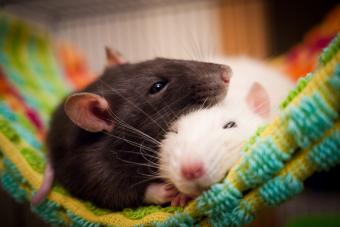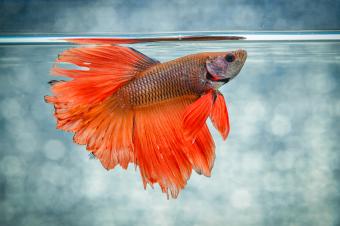
One of the hard parts of owning a pet is dealing with their short lifespans compared to humans. There are some pets with short lifespans of 5 years or less. Despite their short time with us, they still make wonderful pets and can be great choices for people who can't commit to owning a pet for five years or more.
Pet Rodent Lifespans
Rodents make fabulous small pets, especially for apartment dwellers and people who can't keep a large pet like a dog for physical, health, or other reasons. Unfortunately, rodents have some of the shortest lifespans among companion animals.
Guinea Pig Lifespan

These adorable small pets live about 4 to 6 years. Guinea pigs are sensitive to their environment and can suffer easily from respiratory diseases, so keeping your pig's cage clean is an important part of helping them live as long as possible. They also have specific dietary needs, including a need for a regular supply of quality hay and vitamin C. Guinea pigs also do better with a companion, so consider this when deciding if you have the space and time to care for a Guinea pig.
Rat Lifespan

Rats are intelligent and affectionate pets that often surprise people who would never think of them as excellent companions. One of the downsides of owning rats is they only live about 1 to 3 years. The more you provide them with mental and physical enrichment, a clean cage, and a healthy diet, the more likely it will be that they live longer. Rats also are social creatures and do better with at least one or more rat companions to keep them healthy and happy.
Mice Lifespan

Like rats, mice live around 1 to 2 years, though some have been known to live up to 4 years. The best way to keep your mice living as long as possible is to keep their cage clean, as they're particularly sensitive to ammonia buildup from urine. They also are sensitive to temperature, so their cage must be kept within the 65 to 80 degree Fahrenheit range to be healthy. Similar to other rodents, they are social and having other mice companions can keep them healthy, although male-to-male pairings may become aggressive toward each other.
Hamster Lifespan

Hamsters can live from 1 to 2 years on average. Like other small rodent pets, their lifespan can be greatly influenced by their environment. This means you need to keep their cage regularly cleaned of urine and feces, provide them with optimal nutrition, including fresh foods, and make sure their behavioral needs are met. Unlike some other small pet rodents, such as rats and mice, hamsters do better as solitary pets and may become stressed and fight when placed with other hamsters.
Gerbil Lifespan

The most common species of pet gerbil, the Mongolian, can live about 2 to 4 years. Less common species found as pets are fat-tailed gerbils, who live about 4 to 7 years, and Libyan gerbils, who live about 2 to 4 years. Gerbils can live their fullest lives when you provide them with good nutrition, keep their cage environment clean, and by ensure they get appropriate chew items for their teeth. Overgrown teeth can greatly shorten their already tiny lifespan, as this condition limits their ability to eat properly and malnutrition can set in.
Pet Lizard Lifespans
While many pet lizards can live 15 years or more, there are few common pet lizards that live 5 years or less. These lizards also have a small size in common.
Green Anole Lifespan

The green anole is a small lizard known as the American chameleon because of their ability to change colors. On average, they live about 4 years as pets, though they have been known to live up to 8 years. In order to help a green anole live a full lifetime, it's important to keep their cage with optimal heating, lighting, and ventilation conditions. They commonly become ill if their environment is too damp and cold, and if they are not getting proper nutrition, which can lead to metabolic bone disease.
Chameleon Lifespan

There are several species of chameleons commonly kept as pets, and many of these live 5 to 10 years or more. However, one species, the panther chameleon, lives for about 2 to 3 years, though it's possible for them to live as long as 5 years. Like other lizards, panther chameleons will live their longest when provided with a regularly cleaned environment that meets specific temperature, lighting, and humidity needs. They also need proper nutrition, which includes a diet of live insects and supplements.
Hedgehog Lifespan

Hedgehogs are another small pet that has a relatively short lifespan. They live about 4 to 6 years on average, though it's possible for them to live as long as 10 years. The best way to keep your hedgehog living a long, happy life is providing them with an appropriate cage with hiding spaces and the right lighting and temperature for their species. They do need time out of their cage to explore and are solitary animals, so keeping them alone in their cage will keep them from getting stressed.
Fish and Aquatic Pet Lifespans

Fish can live a very short time, and often this is due to improper water conditions in their tanks, or being kept in tanks that are too small. However, there are several common species of pet fish that do not live long lives, even when kept in pristine conditions.
Mosquitofish live about 12 to 18 months, while betta fish, tetras, guppies, gouramis, mollies, and platys live about 3 to 5 years. The best way to keep your fish living their longest is by maintaining a clean tank with frequent water changes, maintaining a species-approrpriate temperature, and making sure the tank size fits the size and number of fish you are keeping.
Octopus Lifespan

Various species of octopus have become increasingly popular for home aquariums. These intelligent and fascinating creatures unfortunately only live a short time. Certain species, such as the Caribbean dwarf octopus, only live about 8 to 10 months, while others can live up to 2 years. Keeping an octopus healthy to live their longest entails keeping very specific water conditions and offering an extensive live diet, which makes them a difficult and expensive pet to keep.
Why Do Some Pets Live Shorter Lives?
Smaller pets tend to live shorter lives than larger ones, though this is not necessarily the case with every species. With small pets such as rodents, smaller lizards, and fish, the reason for their shorter lifespan may lie in their evolutionary makeup. Because these animals do not tend to live a long time in the wild, scientists believe their bodies evolved in ways where living longer would not be a critical factor because it was unnecessary.
For example, mice and rats in the wild live shorter lives, most likely due to being eaten by cats and other predators. Therefore, there was no evolutionary advantage for them to develop stronger cells and biological abilities to handle physical and environmental stress. Researchers also believe animals with a faster metabolic rate tend to have shorter lifespans. Regardless of why they live short lives, they can still make wonderful pets, and providing them with species-appropriate care can help them live their lives to the fullest.







